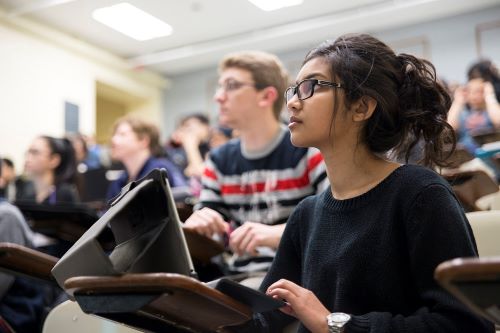
Curriculum-integrated experiential learning (CIEL) involves curricular activities in which students purposefully apply their disciplinary knowledge through real-world projects and experiences.
Students can participate exclusively under the supervision of course instructors or with an external partner. Opportunities can take place in a variety of environments and formats (online, in-person, etc.).
Are you a faculty member looking to embed experiential learning into your course or program? Reach out to the Experiential Learning & Outreach Support (ELOS) team to discuss your ideas and goals and learn how we can help.
The Sandbox
This innovative experiential-learning program partners multiple Faculty of Arts & Science courses with the same partner organization, empowering students to create multifaceted solutions for real-world challenges while building multidisciplinary skills.
CIEL at Arts & Science
At the Faculty of Arts & Science, curriculum-integrated experiential learning activities are:
- Integrated into curriculum intentionally to align with the program and course learning outcomes.
- Designed to directly engage students in authentic experiential practices.
- Assessed meaningfully and include opportunities for engaged feedback.
- Supported by ongoing and structured critical reflection.
While the nature and scope across Arts & Science differ, U of T has developed a framework which classifies CIEL into 10 distinct types:
Partnership-Based Experiences
A work experience that integrates academic learning with its application in a workplace. The experience has an in-class academic component. This type of experience is primarily intended to support the development of professional or industry-specific skills and competencies.
A practice-based experience where students observe or assist a licensed or registered professional through the hands-on application of disciplinary concepts in a professional setting. This type of experience is typically a requirement for professional licensure or certification and is primarily intended to support professional competency development. Students do not have an independent workload/caseload while on practicum.
A practice-based experience where students participate in components of a discipline or profession through the hands-on application of disciplinary concepts. This type of experience typically occurs under the direction or supervision of a non-faculty professional and is primarily intended to support professional and discipline-based competency development. Experiences where students are only observing professional activities (e.g., field trips) are not considered field experiences in this context.
A project-based research, design, consultancy, creative or artistic work experience undertaken in partnership with an organization or individual external to the university or the course. The primary purpose of the experience is typically praxis, knowledge exchange or dissemination, and/or the development of new knowledge, products, technologies or services.
At Arts & Science, organization-partnered projects involving real-world challenges are embedded in courses through The Sandbox. This innovative program allows courses from multiple academic disciplines to work on the same project for a partner organization, delivering multifaceted solutions while building students' multidisciplinary skills.
University-Based Experiences
A project-based research, design, consultancy, creative or artistic work experience undertaken in partnership with an organization or individual external to the university or the course. The primary purpose of the experience is typically praxis, knowledge exchange or dissemination, and/or the development of new knowledge, products, technologies or services.
Students participate in an immersive learning experience in an educational setting that replicates workplace tools, processes and/or environmental circumstances present outside of the university.
Students either participate in or observe the application of disciplinary or professional practices under the direction or supervision of a U of T faculty or staff member. This type of experience is primarily intended to support professional or discipline-based competency development.
Students apply design methods, principles and practices to a significant, open-ended design project. This type of experience typically involves the development of a design project from an initial concept to a final working prototype.
Students participate in inquiry-based laboratory experiments and apply advanced tools and techniques used in research labs. Advanced laboratory courses are typically 3rd or 4th year courses in which a student uses an inquiry-based approach to apply theory and practical techniques learned in earlier courses, typically building on skills learned in introductory lab courses. Students in advanced laboratory courses must be involved in investigating a problem, planning, and executing the experiments to study the problem, and critically analyzing the collected information or data. Students are not simply following a “recipe” or pre-defined set of steps. Labs are often scientific or technological in nature; however, other types of labs also exist, such as language labs in the humanities. Labs are distinct course components, separate from a lecture, seminar, or workshop. Students may work in small groups or independently.
Students undertake a substantial research project that includes some of the following characteristics: student-generated or selected research questions, methodologies, conceptual frameworks, and project management plans; analysis and synthesis of collected information or data; and demonstrated understanding of research results in the context of the broader disciplinary literature. The research project must involve systematic investigation, discovery, synthesis and/or application of information designed to solve a specific problem or answer an original research question. Some examples of Arts & Science research-intensive courses are independent study projects, Research Opportunities Program (ROP) courses, undergraduate thesis projects and research project courses.
Interested in Digging Deeper?
Arts & Science's curriculum-integrated experiential learning framework offers a detailed comparison of the many kinds of CIEL opportunities, from research projects to work placements. It will help you consider which CIEL activities would be the best fit for your courses, students — and you.

